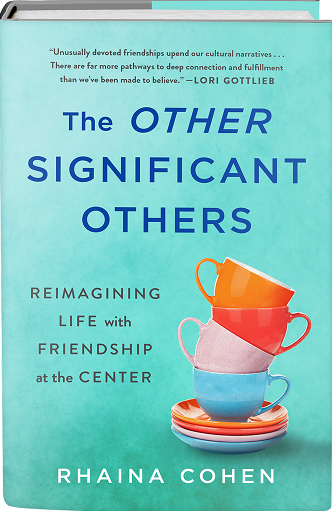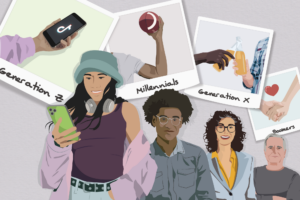Newsletter March 7, 2024
Reimagining Friendships in Everyday Life

Reimagining Friendships in Everyday Life
An Interview with author Rhaina Cohen
In the second year of the pandemic, with our ability to gather curtailed and social activities severely reduced, I began to wonder about the toll it was taking on social ties, especially friendships. In May 2021, we published one of the first major studies dedicated to understanding these varied and valuable relationships.
The results were not encouraging. The State of American Friendship: Change, Challenges, and Loss documented a dramatic decline in the size of Americans’ friendship circles. Compared to just three decades ago, Americans today have far fewer close friends, are less likely to have a best friend, and younger Americans rely less on their friends than they once did. But not all Americans were experiencing the same precipitous social decline. In an op-ed published shortly after the report came out, I flagged the gendered nature of this divide:
This friendship recession is particularly bad for men. The percentage of men with at least six close friends fell by half since 1990, from 55 percent to 27 percent. The study also found the percentage of men without any close friends jumped from 3 percent to 15 percent, a fivefold increase.
The research sparked widespread public interest and concern. These findings, and related research, led the US Surgeon General to argue that the country is experiencing an “Epidemic of Loneliness.”
But there were plenty of people who were invested in this topic of friendship long before our poll came out. For years, scholars, writers, and thinkers have explored the complicated dynamics and evolving role that friendship plays in our lives. Rhaina Cohen is one of those people.

Rhaina Cohen is a DC-based journalist, producer and editor of NPR’s documentary podcast Embedded, and a self-described “social science nerd” with a longstanding interest in the topic of friendship. In 2020, Cohen wrote a thought-provoking piece titled: “What if Friendship, Not Marriage Was at the Center of American Life?” Last month, Cohen published a new book, “The Other Significant Others: Reimagining Life with Friendship at the Center,” that challenges many preconceived notions of the role that platonic friendships play in our lives. She writes:
This is a book about friends who have become a we, despite having no scripts, no ceremonies, and precious few models to guide them toward long-term platonic commitment. These are friends who have moved together across states and continents. They’ve been their friend’s primary caregiver through organ transplants and chemotherapy. They’re co-parents, co-homeowners, and executors of each other’s wills. They belong to a club that has no name or membership form, often unaware that there are others like them. They fall under the umbrella of what Eli Finkel, a psychology professor at Northwestern University, calls “other significant others.” Having eschewed a more typical life setup, these friends confront hazards and make discoveries they wouldn’t have otherwise.
The Survey Center’s Kelsey Eyre Hammond caught up with Cohen to talk about why these relationships are so important to us and what it means to live a life with “friendship at the center.”

American Storylines: I really enjoyed your book I think it was really meaningful and validating for a lot of people. So, I wanted to start by asking what initially sparked your interest in this topic? And I know, you talked about this in the book so readers can find more there, but I would love for you to give a little summary of what sparked your interest in this?
Rhaina Cohen: I mean, I fell into a friendship that raised really fundamental questions for me about what friendship can be. What it is. So, I met my friend who I call M in the book, and we discovered that we lived a five-minute walk away from each other, which made it so that we would spend a ton of time together. I would stop by her house on the way to commuting in the morning. Our lives were intermingled in a way that you would expect of a partner’s. People tended to invite us together to events and saw us as a unit. We had our own friends and world and work and so on. But, there was a way that we were seen more as a bit of a package than I think is often the case for friends. And one of the questions for me was, why don’t I have a label for this relationship? Why is this relationship a little hard to explain. At one point, a friend of mine even asked me, what the difference between my romantic relationship, with the person who’s now my husband, and my friendship was and I had a hard time answering that. So, this specific friendship kind of got me to a place of wanting to understand these sorts of friendships that are so close that they are basically partnerships and what we can learn from people in the past and present who have had them.
AS: That’s great. I love that. Did you know other people who were in similar situations when you first started your research? Or did you have to seek those people out a little bit more?
RC: I did have some idea, or some models. I had a friend in high school who had a really, really close friendship that, at the time, I envied, because of the way that they could call on each other in the middle of the night if they needed that. And I remember my teenage years, even though I had a lot of friends, I didn’t have a “person” in that way. There was this trio of women in my high school, who were a couple years older than me who had this friendship and still do, like 15 plus years later. So, I’d seen versions of that in high school. I’d also seen pop cultural depictions on Broad City, the main characters in that show is one example. I also knew a little bit about the history of what are called “romantic friendships”. So those are very intimate, same sex friendships that were common from around the 17th century through the turn of the 20th century. So, I knew that there were ancestors essentially. And that there were some contemporary people. But I assumed that I just scratched the surface with the people that I had known directly and the bit of history that I had kind of stumbled upon earlier.
AS: Okay very interesting, so, there’s context there, but the fact that you’ve dug into it in a way that a lot of people haven’t is really meaningful and cool. So, the next kind of follow up question I have is, what do you feel the majority of Americans misunderstand about the role that friendship can play in their lives? Or the role that friendship should play in their lives?
RC: I think there’s a very neat hierarchy that Americans set in their relationships, where friendship is, you know, pretty close to the bottom, or certainly underneath romantic relationships and familial relationships, and even things like career. People tend to treat friendship as if it is something that is just disposable or replaceable, like you can make a decision to change jobs and then move to another place. They think, “I’ll have to leave my friends behind. But it’s not that big of a deal.” versus, if you had to leave your spouse behind, I think there would be this really clear recognition that there’s something that’s lost. And I think for a lot of people, if not an individual friendship, but, a network of friends is an enormous thing to give up. But it is sort of par for the course for a lot of people. I think it’s low on the hierarchy. There are limitations that are, I think artificial, that people place on friendship, where there are certain activities that you’re only expected to do with a romantic partner, or like to have as a plus one to a wedding or some other event, you know, be the person who takes care of you in the hospital. There are activities that that friends or maybe cornered off from that actually reinforce the lack of closeness and friendship because in order to create those sorts of really close ties, people need to feel responsible for one another and bound to each other in that way.
AS: Is it almost like, the traditional structure of marriage that sort of creates that opt-in to being someone’s “person” and you wish that existed for non-romantic relationships?
RC: Yeah, there’s a script to follow or something that’s called the relationship escalator, where you get on and just like with an escalator, you’re kind of like rising through levels that know exactly where you’re going. And you can get off, but, there aren’t different routes to take. It’s a straight path in one direction. I’ll just say that I don’t think that marriage or romantic relationships are antithetical to having really close friendships. And in fact, we probably, as a country could improve our romantic partnerships by spending more time on the friendships in our lives. But that is the misunderstanding- that there’s a hierarchy and a belief that a romantic relationship is supposed to consume most of your energy and that it’s kind of zero sum to spend time on friends.
AS: I think that there’s probably a lot of people who have sort of followed the script of putting all of their effort into their marital relationship or their romantic relationship, and then found themselves a little bit lonely and wonder if that is a failure of their marriage, when in reality, it’s just that it’s good to have more people in your life.
RC: Yeah. I mean, I think that’s one of the things that is most sad but also hopeful about the status quo. People might be feeling dissatisfied in their romantic relationships, and assuming that it’s their own fault, without realizing that who we are in a romantic partnership is going to be affected by the kinds of richness we find in other areas of our lives. An understandable comparison might be, if someone is having a terrible time at work, then they’re probably not going to be as good of a partner, even though you would think those things are unrelated, all those things are going to affect your marital relationship. We can’t compartmentalize these things.
AS: Yeah, that’s so true. And I think we kind of think relationships are separate from other things, when in reality, they’re all encompassing.
RC: Yeah, this might sound kind of flippant, but my husband has gotten super into pickleball in the last six months and, he’s just a demonstrably happier person. He has a very sunny disposition in general, but I think it’s created boundaries with work, because he really wants to play pickleball, and it’s a social sport, and the endorphins make him happy. And, I think he’s probably less stressed at work, and also just a happier person to be around. So I think if it can be true for doing something like exercise, doing a social activity or sport, then I think it’s can be true for friends, too. All of the goodness kind of feeds into other areas of life.
AS: Yeah, I love that. That’s a very endearing anecdote. Okay so another question I have, we’ve found in our research that Americans tend to make a lot of friends when they’re young but they’re far less likely to develop new friendships as they get older. Why do you think this is? Do you feel that matters? What are your thoughts on that?
RC: I think probably part of the answer is about the conditions that lead to friendship and the extent to which those conditions exist when you’re young versus when you’re in your 40s or 50s. There was a psychology professor who I spoke to, named Lisa Diamond, and she talks about attachment relationships– which could be like a parenting relationship, or romantic relationship, or a really, really close friendship. She says that the three ingredients for an attachment relationship are time, togetherness and touch. And, in my childhood, I had those conditions aplenty. I had a lot of free time, certainly before I was dealing with homework. Even when I was doing extracurricular activities, I was with my peers, who I was friends with. And being around people at school and extracurricular activities and having sleepovers etc. all forged a lot of togetherness. There are also lots of opportunities for affectionate touch. Even in the context of like sports, or other organized activities that are physical in nature can provide that. Now, when people are in their 30s, or 40s they feel time is scarce. They are around their co-workers, but that doesn’t necessarily translate into friendships where you are living life together. I also think people don’t have that much physical affection touch in their friendships. That’s one of the behaviors that people don’t feel comfortable doing outside of romantic relationships. Anything beyond even hugging can be considered too much for adults. So, essentially, one of the things that probably leads to this divide is just that older adults are not living in dorms or going to school every day with their peers and don’t necessarily have much free time and don’t invite people in to just like, coexist with them. Last night, for example, I was picking up dinner, and I called some friends of mine, who live a five minute walk away and I was like “Can we come over? We can have dinner at your house with your baby and we’ll just hang because I’m about to leave for a trip,” and they said yes! So, those were meals and conversations we could have had in our separate homes, but we were comfortable enough to have that spontaneous interaction. And, it was easier because we live nearby. So, even though we are all short on time, just joining up for that kind of everyday thing makes it possible for us to be closer. But I don’t think a lot of people would think to ask friends for that- if they even have people in close proximity. A core decision that people make when they have kids is often to move to have more space and that takes them farther away from friends.
AS: When people are in college, the idea of taking their takeout over to a friend’s house to eat is very normal and people often just pop in. But in the context of adulthood, people have kids or they are just busy, they think, “I can’t intrude!”, but in reality, when you have close relationships, people want you to ask them to hang out. If any of my friends texted me like you did and said “Can I eat my take out your house so we can chat?” I would say “please!”. So, I think that if people want to have more meaningful relationships they could try to mimic those patterns that we see at the younger ages as much as we can.
RC: Dorm life really is structured for social interaction. I lived in a really crummy dorm, but I had a great setup where there were individual rooms, but then there were suites, so they were really built for you to congregate. Inevitably, everybody in a given suite would become friendly with one another. So, we wonder what is the physical layout of our adult lives? The dream for most people or this sort of “sign of success” is that you either live with a partner or you live alone, not that you live with roommates. You only do that by necessity. There’s so much emphasis on privacy and control over space. In the middle of a novel called, All This Could Be Different there was a funny line about how at some point in their 20s, people become obsessed with interior design. Suddenly, everybody starts getting nicer furniture, and gives tours of their space. I also you know, love me some West Elm, but it represents a reprioritization where, in order to get the nice furniture and control over your space, you lose the ease that makes it possible to build and then cultivate friendships.
AS: That is so interesting. It totally makes me think of the apartments in my college town where they would have five gross couches in a very small living room just because they want to be able to fit as many people as possible in for a movie or something.
RC: When I was talking to my friends, we’d each heard a couple of very similar stories from kids about the ideal way to live. One that I heard directly from two parents who have four children and moved into a new house where they have more space, and they gave the opportunity to one child to have her own bedroom. And she said “No, we all should be together!” And all of the kids said that they of course wanted to sleep in the same room, even though the youngest kid was very young.
Another friend told me a story of these kids who live in an urban area, visited some family friends who live in a big house in the suburbs. On the way home, the kids said, “they have to sleep in separate bedrooms! It’s so lonely!” So, some people really want space. I know people who absolutely love being alone, but I think it is worth questioning what the thing is that we’re all supposed to be striving for. I think the other way to look at it is that we’re building our lives to be pretty isolated. And even if we get nice decor as part of it, or a nice backyard, how much is it worth it versus things that we’re losing?
AS: That’s such a good point. I love that. So, the next question is more about the gender dynamics that play in friendships. So, we see in our research that men and women approach friendship very differently. What did you learn about this while you were researching for this book?
RC: It was definitely hard to find straight men who had these friendships. I couldn’t really take a representative sample of these friends because, there’s no term for them so, there’s no data on them. But I do think it was representative that it was harder for me to find straight men with such close friendships. I think there are several things going on. One is that it’s just really hard for men to have emotional intimacy with each other past the preteen years. Niobi Way has done a really great ethnographic work looking at preteen and teenage boys and the way that they’re kind of vulnerable but have to put up a wall at a certain point. So, that’s one piece. Another has to do with romantic relationships. I think both men and women in heterosexual relationships are sort of encouraged to have their person- somebody who’s their everything. Women, have more of a tendency to maintain friendships. There’s data looking at how heterosexual women are more likely to find that they have more emotional intimacy with their female best friend than with their male partner. But, that’s not the case for men. In terms of these particular friendships, straight men constantly had to deal with misunderstandings or judgments that the women did not experience. There’s a couple of men who I wrote about in a recent New York Times piece, they’re not actually in the book. They’ve just heard every joke about them being gay, and it’s not that they’re worried about being perceived as gay, but it is annoying to them, that it is impossible for people to imagine that they talk to each other on the phone every day. There’s something incompatible with our prevailing ideas of masculinity and kind of intimacy for men. They can’t get away with having these sorts of friendships.
AS: Do you think a lot of men have a desire to have these close friendships, but they feel embarrassed to pursue that type of emotional intimacy with somebody? Or do you feel like the desire is not there?
RC: I had a conversation with someone a couple of weeks ago. I was surprised given that he works in a clergy capacity, that he has trouble making deep male friendships. We have this joke about how he’s trying to find deep dudes. He’s even tried to push some of his friends to not just talk about sports and so on. They took a trip together and he brought these cards by Esther Perel for prompts and then he went back to his girlfriend and talked about their discussions. She said, “The things you guys talked about are actually like, really basic questions”, these were questions like, “are you planning to marry your girlfriend?”. I haven’t talked to these men who were friends with the person who’s seeking deep dudes and I don’t know if they have no desire for it, but I certainly think there are lots of men who want this and have no idea how to get it. I also imagine that there are a lot of men where, it does not occur to them that there’s anything wrong because they are doing the thing that you’re supposed to do, which is partner up and then have your girlfriend or your wife, be the person who handles all of your emotional needs, and you don’t necessarily reciprocate, or you don’t have any other kinds of places to offload that. So, I think there was a mix of some people not even realizing that there’s any other way to be, and some who are really like craving something different by not necessarily finding it when they make a leap or not making a leap because there’s an assumption that nobody else wants this.
AS: A lot of the research that we do often ends up being sort of pessimistic about the trajectory of American friendship because of decreased community reliance etc. But, is there a reason for optimism? Do you feel like we should be more optimistic about the future of friendship or do you feel like there’s more work to be done? Maybe, the answer is both.
RC: One of the things that was so energizing about working on this book was feeling like the people who I was writing about were emissaries from a world as it could be. They were already living out a set of possibilities that is very much attainable, but other people don’t know it is possible. So, I think there’s a lot of hope, in looking at the stories of people who have found really deep support in their friendships. I think it takes a willingness to fundamentally question the standard beliefs around what makes a good life, and to think differently about trade-offs in big decisions. There are also policy issues that can change. For example, what would it look like to have housing that is more accommodating to this way of life. I’ve also been pretty astounded by the response to the book so far. I’ve also written an article several years ago, about people who dreamed of building their lives more around friends. People talk about wanting to live like the Golden Girls. There’s this already viral story about a set of friends who built a kind of compound in rural Texas to live together. So, I think in many ways, the desire is there for a lot of people, but there’s not a sense that it can be anything more than a fantasy. And what I think these the friends in the book show is that it actually does not have to be a fantasy, and that it takes intention, and coming up against people’s misunderstandings and judgment, but that it’s not fundamentally unattainable. And there’s a mix of personal decisions and interpersonal decisions that we can make, and having a culture that has more recognition of the significance of friendship.
AS: So, what are some additional or final questions that you have about friendship and loneliness? And what are you interested in still finding?
RC: Yeah, I’ve just become increasingly interested in more of the structural conditions that can enable friendship or make it more difficult. In the book, I’m really looking at people who I think of as “Olympian level friends”. These are people who are having hard conversations, putting in a lot of work, bucking norms, in order to be as integrated into their lives as they are. I have thought about the flip side, maybe it doesn’t have to be so hard. I’ve spent some time visiting people who are living in what are called “co-living communities”. In these communities, there’s a mix of private space, but also communal space. I’ve heard from several of these people that they feel that they are socially lazy. Which is really hard to compute because they also say that they volunteer for the play that they put on every month, and they have these dinners every Sunday, and all these other activities and yet they say they’re lazy. I wonder, how is that possible? And well, on a college campus, did you have to be reaching out for coffee dates? And how much work did you have to put in? So, I think, what if the setup of your life makes it really easy to have those sorts of run ins? How can we make it easier for me to drop into my friend’s house or to call them at 7pm and ask if I can come over at 7:10?








